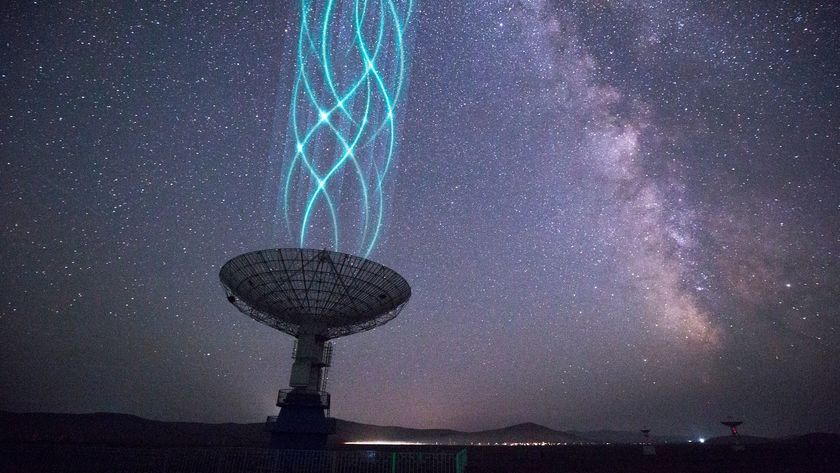They're Out There! Most People Believe in E.T.

Are humans alone in the universe? A majority of people, particularly guys, in the United States, United Kingdom and Germany say they believe that intelligent life is out there.
Fifty-six percent of Germans, 54 percent of Americans and 52 percent of people from the United Kingdom believe that alien life capable of communication lives somewhere among the stars, according to a new survey by the marketing research firm YouGov.
However, in the United Kingdom at least, people are slightly cautious about whether humans should reach out to E.T. Among U.K. respondents, 46 percent said a digital message should be sent into space in the hopes that it reaches intelligent aliens. Another 33 percent said no message should be sent, and 21 percent said they weren't sure. [7 Things Most Often Mistaken for UFOs]
Searching for E.T.
Humanity has long wondered whether it is alone in the universe, and the search is on to find the answer. The SETI Institute in California, for example, uses radio telescopes to hunt for signals from alien civilizations.

In July, physicist Stephen Hawking backed two new projects for the search. The Breakthrough Listen project aims to use the Green Bank Telescope in West Virginia and the Parkes Observatory in Australia to listen for alien radio signals. The Lick Telescope in California will be on the lookout for light signals from lasers as part of that project. (Lasers are directed light beams that can travel relatively far, so there's a chance aliens might use them to get in touch.)
The second project is called Breakthrough Message and is an international competition to draft a digital message to send to the stars. (The message won't necessarily be sent, but researchers say they hope the entries will spur thought and debate about how to communicate with aliens.)
Sign up for the Live Science daily newsletter now
Get the world’s most fascinating discoveries delivered straight to your inbox.
Reaching out
![Most people believe intelligent alien life lurks in the cosmos. [See full infographic]](https://cdn.mos.cms.futurecdn.net/iLTH8JQiHJwrZWkEUonR6Q-320-80.jpg)
Between those who say they believe in alien intelligence and those who say they aren't sure whether it exists, the alien nonbelievers are in the minority, according to the new YouGov survey. Only 12 percent of Germans, 22 percent of Americans and 20 percent of people from the United Kingdom said they do not believe intelligent aliens exist.
The survey also asked E.T. believers why they thought aliens had not yet made contact. More than half (58 percent) said intelligent aliens are too far away to contact Earth. Fifty-seven percent agreed with the notion that human technology isn't advanced enough for people to reach out to E.T.
Of the E.T. believers, 24 percent said that extraterrestrial life knows about Earthlings but chooses not to reach out. Seventeen percent said alien intelligence has already reached out, but governments have covered it up.
Men are more likely to believe in intelligent aliens than are women, and also more likely to say humanity should reach out. A majority of men (54 percent) said humans should try to contact aliens, while only 40 percent of women agreed.
Follow Stephanie Pappas on Twitter and Google+. Follow us @livescience, Facebook& Google+. Original article on Live Science.

Stephanie Pappas is a contributing writer for Live Science, covering topics ranging from geoscience to archaeology to the human brain and behavior. She was previously a senior writer for Live Science but is now a freelancer based in Denver, Colorado, and regularly contributes to Scientific American and The Monitor, the monthly magazine of the American Psychological Association. Stephanie received a bachelor's degree in psychology from the University of South Carolina and a graduate certificate in science communication from the University of California, Santa Cruz.











